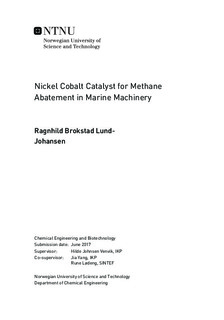Nickel Cobalt Catalyst for Methane Abatement in Marine Machinery
Master thesis
Permanent lenke
http://hdl.handle.net/11250/2615703Utgivelsesdato
2017Metadata
Vis full innførselSamlinger
Sammendrag
Natural gas vehicles (NGVs) have been suggested as an alternative to conventional vehicles in the marine sector, in order to reduce the large contribution this sector provides to greenhouse gas emissions. Natural gas has been found to produce lower emissions particulates and CO2, NOxand SOx gases, than heavy fuel oil, which is conventionally used as fuel for ships. However, the lean combustion that facilitates this reduction, entails methane slip in the exhaust gas which counter balance the environmental advantages by employing NG. Methane abatement from the exhaust gas can be facilitated by complete catalytic oxidation of methane, however, the conditions and the composition of the exhaust gas require demanding properties of the catalytic material. Supported palladium has been shown to display superior activity, but the material s sensitivity to presence of water vapour and the high price and limited availability of the material have encouraged researchers to investigate alternative materials.
In this master thesis mixed metal oxides of nickel and cobalt have been studied for complete catalytic oxidation of methane. The catalytic activity was investigated for dependency on sto- ichiometric ratio between nickel and cobalt, calcination temperature during preparation and deposition of a small load of palladium on the surface. The activity dependency of methane con- centration in feed, and in the presence of water were investigated, to conclude on the activity in realistic exhaust gas conditions. All catalysts were synthesized by the coprecipitation method, and the Pd deposition was conducted by incipient wetness impregnation. The catalysts were characterized with XRD, N2 physisorption, XRF, Raman spectroscopy and TEM.
It was found that mixed oxides of nickel and cobalt generally displayed high activity for methane oxidation at relatively low temperatures, although the activity was reduced reversibly in the presence of water. Kinetic investigations suggested that addition of water altered the kinetic model of the system. The ratio of nickel and cobalt showed limited influence on catalytic activ- ity. The catalysts investigated for this purpose displayed similar reaction rates and activation energies of reasonable values, estimated with a kinetic model that was of first order in methane and zero in oxygen. It was further observed that the catalysts underwent structural changes during first reaction cycle over fresh catalyst. Palladium enhanced the catalytic activity consid- erably, possibly due to the high obtained Pd dispersion and/or a synergic effect between Pd and the mixed oxide support. Based on the kinetic investigation, it was possible that the catalyst comprising palladium followed the assumed model to a greater extent than the mixed oxides. Conclusively, mixed oxides of nickel and cobalt show promising potential for after treatment of NGV exhaust gas.
